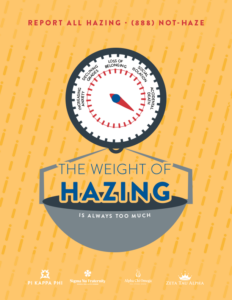Additional Educational Resources
While certainly not an exhaustive list, below are resources from some of our prevention educational partners to assist with your programming.
Prevent.Zone
Hazing Prevention Tips for the Team Leader – Looking for ideas on how to show your support during National Hazing Prevention Week? Share this video excerpt from Hazing Prevention 101™ – Athletics Edition with your team. (Download PDF Tip Sheet)
You’re Not Alone – “You’re Not Alone” is an excerpt from our Hazing Prevention 101™ – Athletics Edition, a 30 minute entirely online course that builds on what college students learned in Hazing Prevention 101. This online interactive course is tailored to the unique perspectives of student athletes and helps them recognize the signs of hazing; it reviews hazing laws and the effects of hazing, employing relatable videos like this to encourage, support, and inspire them to take action against hazing. Visit prevent.zone/hazing to learn more!
Hazing Prevention 101: Smart Steps 4 Staying Safe – Smart Steps 4 Staying Safe is a tool to train college students on how to prevent hazing before it starts and deal with hazing when it starts. Share it with every student you know as you prepare for National Hazing Prevention Week! #NHPW (Download Infographic)
Team Building Activities from Hazing Prevention 101 (PDF)
How Hazing Impacts the Family – “How Hazing Impacts Families” is an excerpt from our Hazing Prevention 101™ Course – College Edition is an evidence-based online course, reflecting best practices established by leading academics studying hazing. This one-hour awareness and prevention-based course teaches college/university students how to recognize, prevent and report hazing. Visit prevent.zone/hazing to learn more!
UVA's Gordie Center
The mission of the University of Virginia’s Gordie Center is to end hazing and substance misuse among college and high school students nationwide.
- The Gordie Center’s prevention toolkit, with free videos and Instagram campaigns to download and use for free!
- Information on alcohol overdose
- Information on hazing prevention

The Lonely Dog is a 15-minute film inspired by Alasdair Russell’s story and is intended to generate discussion about what constitutes hazing, why members feel so much pressure to participate, what makes it so difficult to challenge “tradition,” and how to take positive steps to make the new member process an authentic bonding experience. The Gordie Center collaborated with the Forever Forward Project (led by Alasdair’s mother and producer of the film, Kathleen Sheridan Russell) to create a discussion guide for the film. The film and discussion guide are available free for schools, families, and communities to use in their hazing prevention efforts.
Penn State's Piazza Center
The following resources are aimed at quality hazing prevention that will reduce the number and severity of incidents and increase student safety and wellbeing. Together, we can work towards a safer and more respectful community. (Additional Piazza Center resources)
- Modeling Hazing from High School to College and College to Organizations
The Piazza Center Horizontal Campus Hazing Model offers a thorough perspective on how individual participation in hazing, intergroup dynamics, and group relationships interact within communities. This model serves as a framework for the accompanying monograph, assisting practitioners in shaping prevention and intervention strategies. - Utilizing the Horizontal Hazing Model in Prevention
This guide is designed for campus and organizational professionals and volunteers, encouraging them to consider and implement the model at individual, organizational, and community levels. - Enacting Change at All Levels of the Horizontal Hazing Model
Multilevel strategies reduce hazing. This guide reviews six individual, six organizational, and six community levels strategies. - Employing Situational Strength in Hazing Prevention
Situational strength (Meyer et al., 2010) suggests that environmental cues signal individuals and organizations about what behaviors are accepted and valued. - Designing Effective and Comprehensive Hazing Prevention
Research-driven insights highlight key strategies and the individual, organizational and community levels that inform comprehensive hazing prevention programs. This guide suggests policies and programs as well as outlines promising practices that need more study. - Leading Hazing Prevention Efforts
Student Affairs Officers have an opportunity to develop comprehensive and effective Hazing Prevention Programs. This guide reviews concepts to consider as well as provides a checklist. - Developing Organizational or Campus Amnesty Policy
Amnesty Policies aim to eliminate barriers for students or organizations seeking help. This guide offers fundamental questions, template language, and research to facilitate the development of such policies. - Creating a Peer Mentor and Mentee Program
Well-executed peer mentoring programs can significantly enhance feelings of belonging, mental well-being, persistence, and retention within organizations and campuses. This guide assists in crafting positive mentoring initiatives. - Partnering to Enhance Campus Prevention Efforts
Designed to support organizations at all levels in fostering safe environments and enhancing the overall quality of the experience, this comprehensive resource offers research-informed strategies for loss prevention and risk management. - Recognizing Signs of Hazing
With an increased understanding of hazing causes, practitioners often find it challenging to apply this knowledge in detecting hazing instances. This guide helps practitioners identify early warning signs of hazing behavior within student groups and organizations. - Intervening Ideas for Group Advisors
Alumni offer practical insights on strategies to combat hazing mindsets within chapters - Utilizing Data for Effective Hazing Prevention Programs
Researchers categorize campus data into four types—diagnostic data, implementation data, efficacy data, and data usage—to inform hazing prevention initiatives. This guide delineates four essential activities to enhance hazing prevention efforts, based on the What Works prevention study. - Ensuring Fidelity for Hazing Prevention Program Implementation
Effective hazing prevention necessitates thorough assessment. This guide emphasizes the importance of assurance, capacity, and saturation in developing and executing impactful hazing prevention programs that can significantly reduce the incidence and severity of hazing. - Analyzing hazing and Related Behaviors: A Solutions-Focused Approach
This comprehensive literature review presents an in-depth understanding of hazing and prevention from high school through college. The monograph is structured around the interplay of individual engagement in hazing, intergroup dynamics, and group relationships. Key features include a Hazing Prevention Matrix, practical case studies, and a detailed Horizontal Campus Hazing Model. The Piazza Center collaborated with Dr. Pietro Sasso, Research Fellow, and Dr. Bryan Joyce, Scholar, in January 2021 to conduct a thorough review of hazing prevention literature. In Fall 2021, in partnership with Dr. Patrick Biddix from the University of Tennessee, this initiative expanded with support from the North American Interfraternity Conference, with Dr. Emily Perlow joining the team. - Staffing Impact of University Fraternity and Sorority Programs on Student Success
Initial findings indicate a potential correlation between staffing models and chapter-level outcomes
Educational Posters & Discussion Guides
Association for Student Conduct Administration
The Association for Student Conduct Administration (ASCA) is the leading voice for student conduct in higher education. ASCA and its members are dedicated to upholding the integrity of the student conduct process, resulting in the ability to build safer educational communities and positively impact the higher education experience.
Investigation & Sanction Resources
Holmes Murphy Fraternal Practice Resources for Sororities and Fraternities
Holmes Murphy offers this educational information to provoke thought and discussion and it should not be viewed as a mandate or requirement. (Additional Holmes Murphy resources)
Amnesty Resources
Investigation & Sanction Resources
Hazing Prevention 101™
Hazing Prevention: It’s Everyone’s Responsibility™
This comprehensive, evidence-based online hazing prevention program delivers research-informed, customizable education for today’s students and campus communities. The program includes core modules for all students, along with targeted content for Fraternity & Sorority Life, Athletics, Creative & Performing Arts, and Faculty & Staff. Participants learn how to recognize, prevent, and report hazing, build skills to stay safe, and understand the evolving realities of hazing—including technology-facilitated hazing behaviors. Emphasizing positive actions and healthy alternatives, this fully refreshed program establishes a strong baseline for prevention while supporting compliance with local and national and education requirements such as the Stop Campus Hazing Act.
Editions are available for Colleges & Universities, High Schools, and Inter/national Fraternity & Sorority Organizations.
Students at University of Central Florida taking the hazing prevention pledge
Additional Resources
Questions?
If you have questions, contact Todd Shelton, Executive Director.





